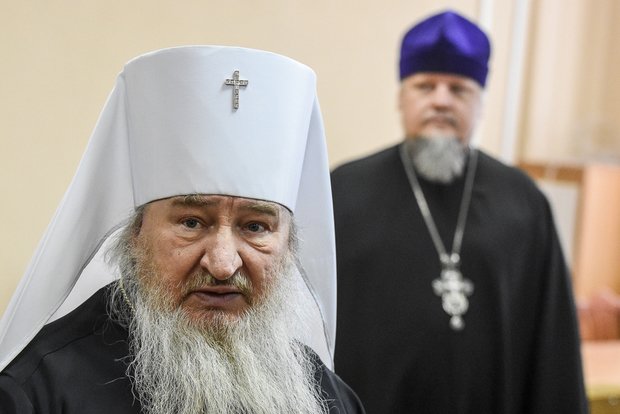Vsevolod Chaplin: ''It won’t be simply possible to make those people who don’t want to speak majority languages learn them''
Languages at school: voluntarily but with care
The issue of voluntary or compulsory classes of languages of Russian peoples has already been considered by the State Duma, and deputies are making relative amendments to the law 'On Education in the Russian Federation' (the second reading is scheduled for Tuesday, 24 July). However, debates don't calm down in Tatarstan, Bashkortostan and other national regions. In a column written for Realnoe Vremya, looking back at his own life, Archpriest Vsevolod Chaplin comes to a conclusion that the republics' residents should learn languages of the indigenous people. Moreover, our columnist considers them more necessary than English, Arabic or Chinese.
I feel pity I didn't learn Ukrainian
In the late 70s when my father went to work in Lviv, my parents had a question if I should go with them. I denied, and the main reason for my protest was the unwillingness to learn the Ukrainian language at school. But today I feel pity I didn't learn it and sometimes find Ukrainian words in my memory with nostalgia, which I heard or read when I visited my father on holiday. I feel more pity that I didn't learn Greek in the seminary as one should. I took a usual course some 15 years ago to learn French. I learn to read somehow, but, sadly, I didn't start talking. For practice, I basically didn't have the time, neither do I have it now. If the youth knew and the old age could…
I remember the uneasy history of my relations with the educational system each time when I hear debates about national language classes in Russian regions. A young man is often too pragmatic. ''Why will I need Greek?'' I asked myself when I was a student. I wasn't going to become a bench scientist, moreover, I didn't want to emigrate to Hellas, while it was possible to talk with ''useful'' Greeks in English. And I start to understand only now how accurate Greek philosophic and theological terms are, how voluminous and ''tasty'' they are than Latin or Slavic.

''It's very complicated to make young people learn something. This failed even in the ''severe'' Soviet era.'' Photo: Oleg Tikhonov
Everything repeats. Now many people will likely go to learn more ''pragmatically useful'' Chinese or Arabic, not to mention English, than a less popular language or a language that's easily substituted (same English or Russian). Even if it's a language of your nearest neighbours. I don't certainly like this phenomenon. But it's very complicated to make young people learn something. This failed even in the ''severe'' Soviet era. For instance, I frankly skipped organic chemistry, and I don't regret this. Complicated formulas couldn't come in handy, didn't come in handy and won't come in handy. While I got a C almost anyway because the school didn't want to spoil my marks. I was put a C at least because I could enthusiastically say a couple of words about great Russian chemists in the political context of their life.
The problem of suppression of the local language at mosques became noticed
Now a schoolkid has a choice of priority subjects, which means it's almost impossible to make him deeply learn something he hates and that's unpromising for his future life. The basic language skills, written and oral speech are needed, of course. But, unfortunately, in this sphere, the stupid pragmatics of education takes over. People don't want to learn to spell relying on computer's tips. They update, and professions of editor and translator will remain only in the creative environment soon. As a person who has been writing and editing texts during all his life, it's especially offensive.
And such a complicated reality surround the debate taking place in Tatarstan and other ''national'' republics (Editor's Note: Bashkiria, Chuvashia, Udmurtia and so on). And I think – even though with some regret – it won't be just possible to make those people who don't want to speak majority languages learn them. However, the threat of losing these languages, including by the indigenous population, should be treated seriously.

''The suppression of the local languages at mosques for Arabic or Middle Asian is also a big problem. It's good it's been noticed and people started to solve it.'' Photo: Maksim Platonov
We know how much is done to conserve them, for instance, by the Muslim spirituality of Tatarstan and the Tatar intelligentsia. By the way, the suppression of the local languages at mosques for Arabic or Middle Asian is also a big problem. It's good it's been noticed and people started to solve it.
Peoples' languages aren't heard in federal events
Both the Russian intelligentsia and our spirituality should cover their part of the road. Metropolitan Feofan says: ''I turned out to be a bad pupil, but I try. It turned out it wasn't so easy to learn languages at 70 years. At least, I can't be told off in Tatar – I understand!'' By the way, many languages of peoples in Russia have survived because Orthodox missionaries simply didn't learn them but created writing for them, translated many texts into them and even organised classes for new generations of the locals. Today church service is reviving in some languages that consciously became marginalised by authorities, for instance, in Gagauz.
Perhaps federal authorities could put more serious effort to support the languages of the country's peoples. Good Russian skills and development of mother tongues are the wealth that will give Russia additional importance in the world, especially in Turkic-speaking. It's no secret that big public money is spent to learn same English. Is it possible to re-send at least a part of it to support and propagate Tatar, Bashkir, Mordvin, Yakur, Kalmyk? I'm convinced it is because many will learn English without state support, moreover, without propaganda.

Metropolitan Feofan says: ''I turned out to be a bad pupil, but I try. It turned out it wasn't so easy to learn languages at 70 years. At least, I can't be told off in Tatar – I understand!'' Photo: Oleg Tikhonov
Another important moment is that the languages of our peoples are never heard in federal cultural events. Concerts We Are United in the State Kremlin Palace, which I try to visit every year on 4 November, on Peoples' Unity Day, is a successful exception. One can hear songs in Chechen, Ukrainian, Yakut, Assyrian there. Such performances should be shown more often on television where, by the way, the powerful influence of English-speaking pop is still conserved. If people listen to each other's' languages, they will respect each other, understand we're talking about not an unnecessary ''backwater language'' but the culture recognised across the country.